 |
Das Buch Der Vierzeiler. Khaled Tobar; Salah Dschahin; Ibn Arous; Omar Chajjam. Welten, 2017. 76 p. ISBN: 978-1978164451 |
 |
Das Buch Der Vierzeiler. Khaled Tobar; Salah Dschahin; Ibn Arous; Omar Chajjam. Welten, 2017. 76 p. ISBN: 978-1978164451 |
 |
Edward Fitzgerald’s Rubaiyat of Omar Khayyam. Introduction and notes by Robert D. Richardson; original art by Lincoln Perry. New York, Bloomsbury, 2016. ISBN 9781620406564 |
 |
The mystic Rubáiyát. [Illustrated by Penelope Cline]. Fig Tree Press, 2016. 75 tarot cards. |
 |
The quatrains of Omar Khayyam. Translated from the Persian by Joobin Bekhrad. Bloomington, Balboa Press, 2016. ISBN 9781504362542 |
 |
The Rubáiyát. Along the Red Book Road.Quatrains of Omar Khayyám rendered into English verse by Edward FitzGerald. Introduction by Louis Untermeyer. Paintings by Linda Carter Holman. Oregon House, Red Shoe Publishing, 2015. ISBN 9780976973225. |
 |
John Morris-Jones: Penillion Omar Khayyâm. Golygwyd Dafydd Glyn Jones. Bangor, Dalen Newydd, 2015. ISBN 9780993251016 |
Two new titles have been published recently:
Rubá’iyát of Hakim ‘Umar Khayyám. Selected quatrains of Khayyám. Translated into simple 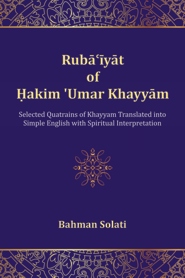 English with spiritual interpretation. Edited and translated by Bahman Solati. Boca Raton, Universal-publishers, 2015. 109 pp. ISBN: 978-1-62734-033-5.
English with spiritual interpretation. Edited and translated by Bahman Solati. Boca Raton, Universal-publishers, 2015. 109 pp. ISBN: 978-1-62734-033-5.
In this edition 60 quatrains are literally translated and presented with a spiritual explanation and with the Persian text of the quatrains. The introduction (20 pages) highlights the most important facts, features and history of Khayyám’s rubáiyat. Solati published a number of studies on Hafez, as well as on the impact of Sufism on post-Islamic Persian literature.
The 108 quatrains of Omar Khayyam. Persian – English – Chinese. [Selection and translation] Sen 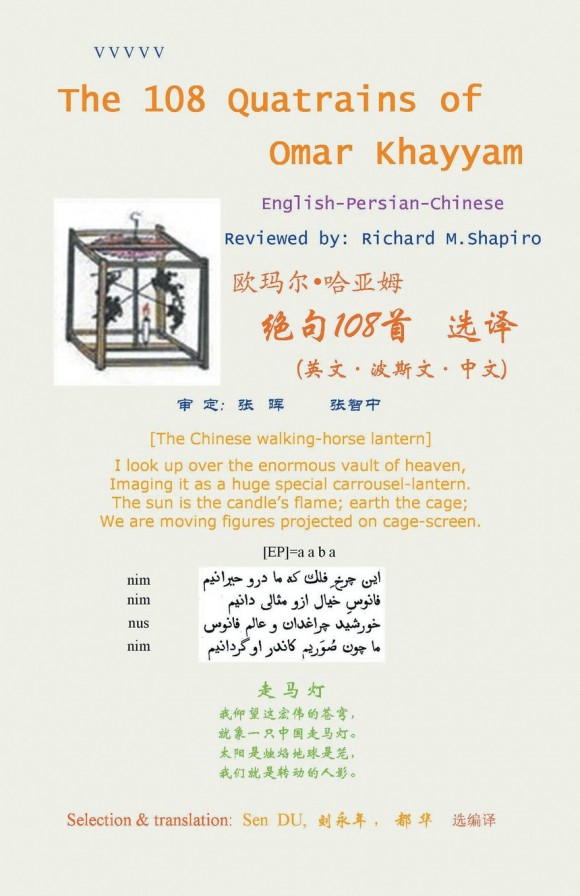 Du. Litfire Publishing, 2015. 148 pp. ISBN: 978-1-942296-75-1.
Du. Litfire Publishing, 2015. 148 pp. ISBN: 978-1-942296-75-1.
This is a somewhat remarkble edition, as it not only presents the quatrains in English, Persian and Chinese, the verses are also classified by subject matter in ten sections. Each quatrain has a title and for each one a rhyme pattern is given for the Persian text. These patterns are collated in a table at the end of the book. The Introduction and the Notes are partially in English and Chinese, whereas the Notes are composed from ‘copy-pasted’ fragments from various older editions and studies, which results in a somewhat cluttered impression. To fully enjoy this edition the reader needs to understand the Chinese language.
 In a recent volume Khodadad Kaviani, associate professor at Central Wahington University, defines Khayyaamism as “a particular worldview that (l) questions the legitimacy of religious practices and beliefs that are contrary to reason; (2) views death as part of life; (3) promotes the enjoyment of life here and now; (4) values camaraderie and friendship; and (5) expresses ideas in short poems.” As a young man, Kaviani left his country in 1979, and had to find his way in the USA. Reading Iranian poetry helped him to stay in touch with his cultural roots, and in Khayyaamism, he would find advice on “how to be a friend, what to do with money, why religion is not all that’s cracked up to be, and much more.”
In a recent volume Khodadad Kaviani, associate professor at Central Wahington University, defines Khayyaamism as “a particular worldview that (l) questions the legitimacy of religious practices and beliefs that are contrary to reason; (2) views death as part of life; (3) promotes the enjoyment of life here and now; (4) values camaraderie and friendship; and (5) expresses ideas in short poems.” As a young man, Kaviani left his country in 1979, and had to find his way in the USA. Reading Iranian poetry helped him to stay in touch with his cultural roots, and in Khayyaamism, he would find advice on “how to be a friend, what to do with money, why religion is not all that’s cracked up to be, and much more.”
Khayyám’s short poems may serve as a vehicle for readers to take a more critical view of issues and values that each new generation has to discover and to discuss. In order to do so, Kaviani provides a method to study the quatrains. Each verse is given in Persian, followed by a translation into English. Next, under the headings “Conversation starter” and “Dig deeper” a varying number of questions is posed for the reader to answer.
In this respect, it is irrelevant to dwell on the question whether Khayyám did really write these verses, “because his poetry represents a way of thinking about life (…), a worldview that opposes religious control over people’s lives and promotes living a full life here and now, in a simple way that brings joy to the person and others.”
Although the methodical approach may seem a bit schoolmasterish (there is a chapter “Note to teachers” with rather strict instructions), it is a brave attempt to make our troubled world a better place to be.
Rethinking khayyaamism. His controversial poems and vision. Khodadad Kaviani. Lanham etc., Hamilton Books, 2014. xii, 131 p. ISBN: 9780761864066.
 French novelist and essayist Renaud Mercier published a versified adaptation of the quatrains from the Bodleian manuscipt, based on the edition by Edward Heron-Allen of 1898. In a short introduction the translator explains why the rhyme scheme has been altered to AABB, which means that there is no ‘free’ third line, as not to discomfort French ears.
French novelist and essayist Renaud Mercier published a versified adaptation of the quatrains from the Bodleian manuscipt, based on the edition by Edward Heron-Allen of 1898. In a short introduction the translator explains why the rhyme scheme has been altered to AABB, which means that there is no ‘free’ third line, as not to discomfort French ears.
The booklet is printed on demand, and is also available as a Kindle e-book, from Amazon.
Les quatrains d’Omar Khayyam (adaptation versifiée). Renaud Mercier. 2014.
72 p. ISBN: 9781494315399
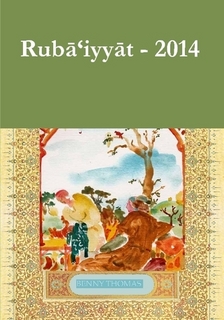 A new version of Khayyám’s quatrains was recently published by Benny Thomas, architect by profession and poet by temperament, in his own words. The work comprises 255 verses, some in rhymes, others only partially rhyming while the rest are blank verses.
A new version of Khayyám’s quatrains was recently published by Benny Thomas, architect by profession and poet by temperament, in his own words. The work comprises 255 verses, some in rhymes, others only partially rhyming while the rest are blank verses.
Thomas’ argument for yet another version or interpretation is that the voice of Omar Khayyam still speaks to us, “because we see in the quatrains our own unexpressed thoughts elegantly phrased”. In his foreword, Aminrazavi describes the quatrains by Benny Thomas as the “silence that makes music of the soul coherent to each”.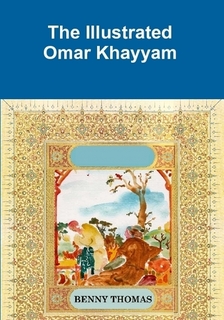
Khayyám’s quatrains must not be viewed “as a case for his adherence to Sufi tradition”, nor does the translator’s (that is FitzGerald), skepticism in the quatrains follow from not being true to the original, as Thomas explains. As a mystic he reads something else in them, or to paraphrase his own words: both Khayyám and FitzGerald are representative geniuses of our cultural heritage, who gave expression to the voice of their souls, the voice of their Inner Worlds.
The book was issued (as prints on demand) in three states: an illustrated paperback edition, a cheaper version without illustrations and an illustrated e-book. The illustrations were done by the translator. Available at Lulu.com.
Unfortunately, the work is not without errors. In the foreword (p. 7/9) we read: “Eight-hundred years after his death, the spirit and message of Omar Khayyám has once again celebrated in the exquisite quatrains …”. Many sentences are incomplete and for me, not being a mystic, some of the verses are almost impenetrable, for instance quatrain #158:
The color that we swore upon with life
Is false hue drawn from lie engenders strife:
In death and all enfolding gloom our souls
Must reorient with what is true or life.
More about Benny Tomas’ translation can be found on his weblog: “The Rubaiyat“, which also shows a number of the artist’s illustrations.
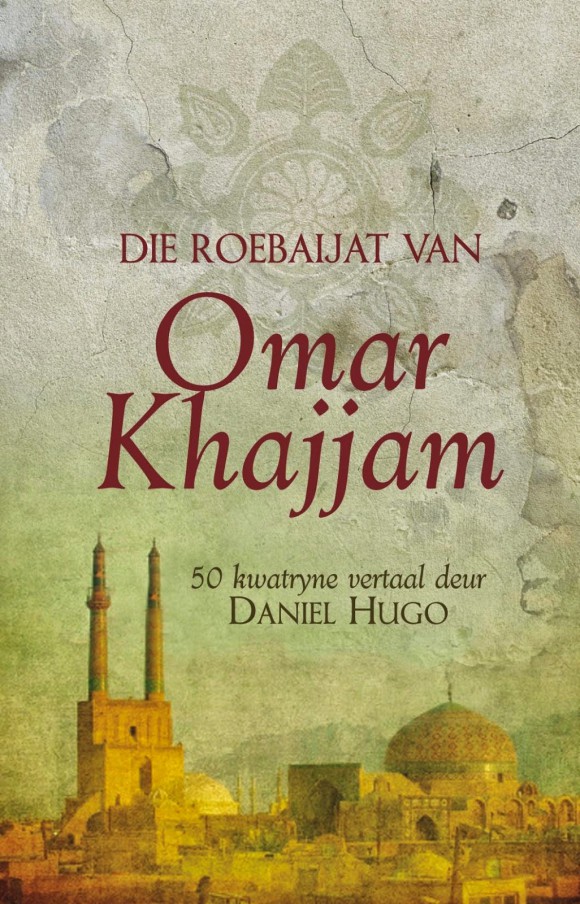 A new translation of the Rubáiyát into Afrikaans was recently published in Pretoria, South Africa, by Proteia Boekhuis. Daniel Hugo, poet and critic, selected fifty quatrains from FitzGerald’s version, which he declares essential, the rest being reiterations. Long ago Hugo was struck by the translation of the Dutch poet J.H. Leopold, when he was a student. Now, forty years later, this resulted in a new publication called Die roebaijat van Omar Khajjam. 50 kwatryne vertaal deur Daniel Hugo.
A new translation of the Rubáiyát into Afrikaans was recently published in Pretoria, South Africa, by Proteia Boekhuis. Daniel Hugo, poet and critic, selected fifty quatrains from FitzGerald’s version, which he declares essential, the rest being reiterations. Long ago Hugo was struck by the translation of the Dutch poet J.H. Leopold, when he was a student. Now, forty years later, this resulted in a new publication called Die roebaijat van Omar Khajjam. 50 kwatryne vertaal deur Daniel Hugo.
Today we know of six translations in Afrikaans:
Listen to the interview with Daniel Hugo on the weekly RSG programme Vers en Klank ![]()
The introduction (in Afrikaans) is also available at Neder-L, elektronisch tijdschrift voor de Nederlandistiek.
Die roebaijat van Omar Khajjam. 50 kwatryne vertaal deur Daniel Hugo, Protea Boekhuis, Pretoria, 2014, 80 pp., ISBN (gedrukte boek): 978-1-4853-0086-1, ISBN (e-boek): 978-1-4853-123-3.